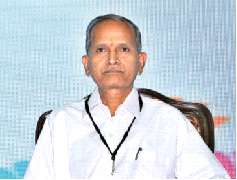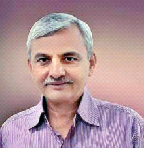“Since its inception Bharatiya Mazdoor Sangh has been raising its voices for the protection of labourers’ interest. Being the largest labour union, Bharatiya Mazdoor Sangh (BMS) has also been awakening people to the Sanatan culture point of view,” said V Bhagaiah, former Sah Sarkaryavah and member of Akhil Bharatiya Karyakarini, Rashtriya Swayamsevak Sangh (RSS), on April 7, 2023. The observations were made during the inauguration of 20th Akhil Bharatiya Triennial Convention of BMS (April 7-9) organised at Keshav Sarswati Vidya Mandir, Patna, Bihar.
BMS & Labours Empowerment
V Bhagaiah, the chief guest, said, “BMS is the organisation of the labourers, for the labourers and run by the labourers. BMS is free from all external influence and it has no association with any political party. BMS talks about the interest of the labourers, along with that of the country and industry.”
Recalling the contribution of BMS during the time of crisis, he said, “When China attacked Bharat, all the political organisations put the country into the dock. However, BMS workers participated in the war.”
Speaking on this occasion, Hiranmay Pandya, President of BMS, said during the Covid-19 crisis, workers associated with BMS selflessly helped the people. He said, “Government policies are not so labourers-friendly. If the Government does not change its attitude and takes steps in the interest of labourers, BMS will go to people. With the help of workers, BMS is confident of winning every battle.”

Satish Chandra, President, Confederation of Indian Industry (CII), Bihar, said, “ The Issue of labourers interest will be the point of discussion during the Akhil Bharatiya Convention of BMS. Whatever emerges after the discussion, it will guide us in future.” “The interest of the nation, labour and industry has always been paramount for the BMS established by the great thinker Dattopant Thengdi. As a result of this, the organisation has reached from zero to peak,” said Ravindra Himate, quoting a letter sent by Prahalad Joshi, Union Minister of Parliamentary Affairs, Coal and Mines. A special session for women was organised on the second day (April 8) of the 20th Akhil Bharatiya Triennial Convention. Asha Lakada, Mayor of Ranchi Municipal Corporation, was the chief guest.
Strengthening women’s leadership
“From education, science, art, sport to politics, women have proved their importance in every area. To imagine the creation without women is not possible. If we think about women, then only women will get the place they deserve. Women working in unorganised sector, should be connected with the organisation, so that they could be organised,” said Asha Lakada.
It is true that women aren’t able to raise their voices against violence. It is important to make your voice heard. For this, if necessary, we will have to take the help of the law. Laws give us protection, said Pragya Parande, advisor, VV Giri National Labour Institute.
In this Akhil Bharatiya Triennial Convention, two resolutions were passed, which will be sent to the Government. The resolution, ‘Social security for all’, was introduced by Surendra Kumar Pandey, All India Secretary, BMS and was approved by Jayanti Lal, Joint Secretary.

“When China attacked Bharat, all the political organisations put the country into the dock; however, BMS workers participated in the war.”-V Bhagaiah former Sah Sarkaryavah, RSS
Social security is the constitutional right of every citizen in the country. Unfortunately, both State and Union Governments have not taken this seriously, said Surendra Kumar Pandey.
“Social security is a subject of the concurrent list under the Seventh Schedule of the Constitution of India. in which both the Central and the State Governments can make laws. Human Rights have been defined in 2 (1) D of the protection of Human Right Act 1993 in which the guarantee of life, equality, dignity of every person is embedded in the Constitution. For this reason, it is also the responsibility of the Government to make laws in this subject. The Hon’ble Supreme Court of India, has also given a detailed judgment on Article (21) of the Constitution, under which the responsibility of social security lies with the Government, It is also the responsibility of the State Governments to fulfil the obligation of “social security” as mentioned in article (41) and (46) of the constitution,” the resolution reads.
Contract system should end
The second resolution, ‘Contract Labour’ was brought by V Radhakrishnan, All India Secretary, BMS, which was approved by Vrij Bihari Sharma, Secretary, Bihar, “Contract workers are being recruited in Government, Public sector and private sector. Here contract workers are being oppressed by the owner and the Government. Therefore, contract system should end to rebuild a better society,” said V Radhakrishnan.
Through this resolution BMS said, “Blind practice of contract labourshould be stopped immediately and at the same time amendments of some provisions of Contract Labour (Regulation and Abolition Act, 1970, is the need of the hour. The complicated process of removing permanent workers at the initial stage gave birth to the contract system but it has become a tool to cut short on spending and investments by the firms. It has now become an easy system of getting more and more workers on contract by keeping minimum permanent employees the pay-roll.”
“It is not enough for any Government to enact a law, but it is also its responsibility to ensure that the provisions of the same law are implemented effectively, strictly and properly. For the Act to be followed there must be at least 20 or more contract labourers working in an organisation and due to this the employer hides their actual number. Hence this provision should be removed,” the resolution reads.
“According to the Constitution of India as well as the directives of the Supreme Court, the principle of equal pay for equal work should be implemented in the cases of contract workers. Though it is mentioned in Central rules (Rule 25) yet it is not followed, therefore, the provision of equal pay for equal work should be made mandatory in the Act itself,” said BMS in its resolution.
“Suitable provisions should be made in the law that the contract workers should get the minimum salary of the pay scale at par with Government employees and the provision of increment should be implemented on the basis of their continuous service,” demanded BMS through its resolution.

“Government policies are not so labour-friendly. If Government does not takes steps in the interest of labourers, BMS will go to people. With the help of workers, BMS is confident of winning every battle.”-Hiranmay Pandya
President, BMS
The third resolution ‘National labour policy should be made for economic development’ was brought by Raj Bihari Sharma, Zonal Organising Secretary and was approved by Dr Dipendra Chahar, General Secretary, Delhi. “There are two main pillars of the economy. capital and labour. These two are equal stakeholders in economic development. But capital has almost one-sided claim/rights over the profits earned from economic development and labour is neglected. The primary goal of any democratic country is justified distribution of the benefits of economic development. The prosperity of a nation is not possible only with the prosperity of capital. It also requires prosperous and happy labour,” the resolution reads.

BMS, in its third resolution, said, “Our country is moving towards rapid economic development. In this period of economic development, there has been a rapid increase in the wealth of the rich while there has not been a proportionate progress in the economic level of the workers. It is clear from this, that the labourers are being deprived from their legitimate rights. The present labour policy and labour laws in the country are only for 7 per cent organised sector workers. There is no labour policy and labour law for 93 per cent of unorganised sector workers.” In this resolution, BMS made few demands: Labour policy and laws should be made for the entire unorganised and organised labour sector; Mutual agreement and collective bargaining should be encouraged; Priority should be given to maintaining industrial peace; Appropriate standards of social security should be determined, and; Compliance with labour laws and timely arrangement for settlement of labour disputes be assured. The fourth resolution ‘Fixation of Living Wages instead of Minimum Wages’ was brought by Shilpa Deshpande, President, VidarbhaPrant and was approved by Somesh Bishwas, All India Secretary.
“Indian economy is emerging as the fastest growing economy in the world. Its ranked 5th amongst all the economies in the world and we in India should be proud of this. The World Bank has also predicted that GDP of India will be between 6 to 7 per cent in the financial year 2022-2023, which is normally better than any other developing country. In this way, India is going to become an economically powerful country of the world. On the contrary, according to the World Poverty Index of Year 2021, India is ranked 66 per cent amongst 109 countries. 22 crores poor people are staying in India which is the largest population of poor people in the world,” reads this resolution.
BMS said that the Government of India should fix living wages instead of minimum wages. In case, the Government fails to do so, then BMS will be left with no other option but to undertake a massive, nation-wide movement at national level.




















Comments